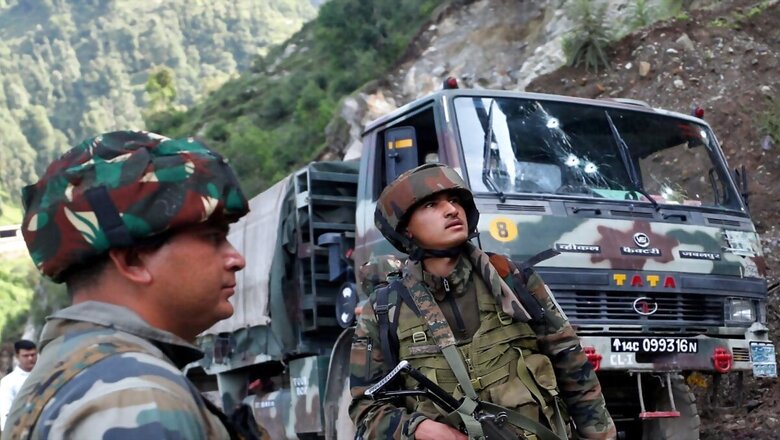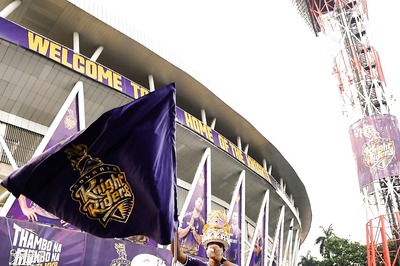
views
All is not well in Jammu and Kashmir. Terror attacks are picking up pace, even as an obvious pattern emerges between the rise in attacks and Narendra Modi’s third term in power. Just as Modi and his council of ministers were taking oath at the forecourt of the Rashtrapati Bhawan on June 9, a heinous attack against Hindu pilgrims in Jammu’s Reasi district left nine dead and several others injured. What followed was a series of attacks against the Indian armed forces in the region, none of which resulted in Pakistan being punished across the border.
The latest attack in Jammu’s Kathua district on Monday claimed the lives of five army personnel, leaving five others injured. Face-offs between security forces and terrorists have risen substantially in the past few months. Interestingly, the theatre has shifted from the Kashmir valley to Jammu, in what is seen as a broad attempt by both Pakistan and China to bog down Indian forces in three separate regions – Kashmir, Jammu, and Ladakh. This allows China sufficient legroom to force Indian forces to stay put in Jammu and Kashmir and not get diverted to the Ladakh front to face off against the People’s Liberation Army.
Direct Challenge to PM Modi
There are other motivations for Pakistan and China as well. The Reasi terror attack was meant to serve as a direct challenge to Prime Minister Modi, on a day when his new government was being sworn in. The assembly election to the J&K legislative assembly is expected to be conducted in the next few months. Given the rise in voter turnout in Kashmir in the recent Lok Sabha polls, Pakistan fears a democratic mainstreaming in the valley which ultimately hurts its vested interests in the long run. Jammu and Kashmir recorded a voter turnout of 58.58% in the general election, the highest in decades. The spike in terror attacks, therefore, has to be seen as an attempt by Pakistan to once again destabilise the region and dissuade not just voters from participating in the election process, but also the government from holding the process in the first place.
The recent attacks also signal a shift in Pakistan’s strategy. Pakistani terrorists’ ability to orchestrate large-scale attacks against security forces may have been stymied, but their shoot-and-scoot approach is working pretty well. Trained terrorists now ambush army convoys and civilians alike, while India hesitates to retaliate across the border – presumably because the attacks are viewed as having limited casualties that do not necessitate cross-border action. This flawed approach only emboldens Pakistan, since it now knows it can get away with small-scale attacks on India without getting bombed.
The Fallout of India’s Missing Retaliation
It could be argued that deterrence has evaporated in recent years, and New Delhi has done nothing substantial to restore it – at least not publicly. The importance of visible and overt action in such cases cannot be stated enough. India usually knows where Pakistani terror launchpads are located across the LoC. There have been instances where reports of such launchpads have emerged in the media space, followed swiftly by attacks in Jammu and Kashmir. Given the obvious correlation between the two, it makes little to no sense for India to keep its hands tied behind its back and shy away from regularly punishing Pakistan for its terroristic proclivities.
Even when India undertook daring cross-border raids in the form of surgical strikes in 2016 and the Balakot airstrike in 2019 after the Pulwama terror attack, these were labelled “pre-emptive” strikes by New Delhi. Calling these strikes “pre-emptive” has always been a misnomer, since they were clearly retaliatory in nature and came in the aftermath of the Uri and Pulwama terror attacks. Be that as it may, the Indian security apparatus and government must both realise that “pre-emptive” strikes must be the order of the day if Pakistan is to be kept in check. Such strikes cannot be reserved for post-facto scenarios alone, where India retaliates to terror attacks but labels the action as “pre-emptive”. Truly pre-emptive action would be for India to strike Pakistan before terrorists infiltrate the LoC and the International Border. This is essential to restore deterrence against Pakistan.
More worryingly, India’s hesitation to strike Pakistan emboldens not just the Islamabad-Rawalpindi cabal, but also convinces China that it can work to India’s detriment using its vassal state. China’s sole focus is on ensuring India gets bogged down on multiple fronts, which is why one sees a rise in attacks in Jammu. Earlier this year, 10,000 soldiers deployed along the border with Pakistan were sent to face off against China along the LAC. Such repositioning of troops poses challenges to China’s own nefarious plans, which is why it makes sense for Beijing to work closely with Islamabad to disrupt the hard-earned peace in Jammu & Kashmir since 2019.
Unfortunately, India continues fighting the war against terror on its soil, when most of such fighting should be taking place in the country that trains, arms, and equips the terrorists. Unless Pakistan is constantly punished for perpetrating violence on Indian soil, India will keep fighting a reactionary battle – waiting for the next attack to occur. The need for India to go on an offensive and seize the initiative has never been greater.
The abrogation of Article 370 sections was a big step in the right direction. However, one decision will not change the reality on the ground. The fact remains that Pakistan continues pushing terrorists into Jammu and Kashmir, who appear to now be getting substantial support from overground workers (OGWs). A domestic crackdown on OGWs and terrorists is obviously needed, but that is hardly going to bring permanent peace to the region. Unless the dragon and serpent are made to feel the pain, innocent Indians and security forces personnel in Jammu and Kashmir will continue getting attacked.

















Comments
0 comment